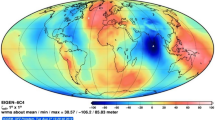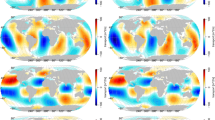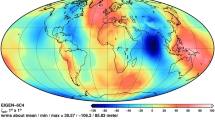Abstract
FOR years geodesists have anxiously awaited the securing of accurate gravity observations at sea for use in the determination of the shape of the earth and in testing the theory of isostasy. The gravity observations made at sea by Hecker, Briggs, and Dufheld were a good step forward in this important work, but their results were not of the required degree of accuracy. They did, however, encourage us to believe that the problem would be solved in the not distant future.
This is a preview of subscription content, access via your institution
Access options
Subscribe to this journal
Receive 51 print issues and online access
$199.00 per year
only $3.90 per issue
Buy this article
- Purchase on Springer Link
- Instant access to full article PDF
Prices may be subject to local taxes which are calculated during checkout
Similar content being viewed by others
References
Proc. First Pan-Pacific Scien. Conf., Honolulu, Hawaii, 1921, Spec. Pub. No. 7, Bishop Museum, p. 885.
Author information
Authors and Affiliations
Rights and permissions
About this article
Cite this article
BOWIE, W. Gravity Observations on the Indian Ocean and the Results of their Isostatic Reduction. Nature 114, 930–931 (1924). https://doi.org/10.1038/114930a0
Issue Date:
DOI: https://doi.org/10.1038/114930a0
This article is cited by
-
Comparison of Different Methods for a Moho Modeling Under Oceans and Marginal Seas: A Case Study for the Indian Ocean
Surveys in Geophysics (2021)
-
Gravity Maps of the Lithospheric Structure Beneath the Indian Ocean
Surveys in Geophysics (2019)
Comments
By submitting a comment you agree to abide by our Terms and Community Guidelines. If you find something abusive or that does not comply with our terms or guidelines please flag it as inappropriate.



